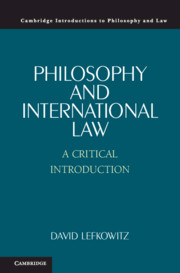Book contents
- Philosophy and International Law
- Cambridge Introductions to Philosophy and Law
- Philosophy and International Law
- Copyright page
- Dedication
- Contents
- 1 Introduction
- 2 John Austin: Enforcement and International Law
- 3 H.L.A. Hart: Social Rules, Officials, and International Law
- 4 Ronald Dworkin: Interpretivism and International Law
- 5 An International Rule of Law?
- 6 The Legitimacy of International Law
- 7 International Human Rights Law: Concepts and Grounds of Human Rights
- 8 The Law of War and Its Relationship to the Morality of War
- 9 International Criminal Law: Crimes Against Humanity and Universal Jurisdiction
- 10 International Law and Secession
- 11 International Trade Law: Free Trade, Fair Trade, and Trade in Stolen Goods
- Bibliography
- Index
11 - International Trade Law: Free Trade, Fair Trade, and Trade in Stolen Goods
Published online by Cambridge University Press: 10 October 2020
- Philosophy and International Law
- Cambridge Introductions to Philosophy and Law
- Philosophy and International Law
- Copyright page
- Dedication
- Contents
- 1 Introduction
- 2 John Austin: Enforcement and International Law
- 3 H.L.A. Hart: Social Rules, Officials, and International Law
- 4 Ronald Dworkin: Interpretivism and International Law
- 5 An International Rule of Law?
- 6 The Legitimacy of International Law
- 7 International Human Rights Law: Concepts and Grounds of Human Rights
- 8 The Law of War and Its Relationship to the Morality of War
- 9 International Criminal Law: Crimes Against Humanity and Universal Jurisdiction
- 10 International Law and Secession
- 11 International Trade Law: Free Trade, Fair Trade, and Trade in Stolen Goods
- Bibliography
- Index
Summary
This chapter addresses the moral justifiability of some of the international legal rules that govern cross-border trade.The primary focus is on the moral standards that ought to be used to critically evaluate those rules or proposals for their reform.Thus the chapter investigates several moral arguments for free trade, such as the claim that it provides an especially effective mechanism for alleviating poverty, and several arguments in defense of restrictions or conditions on trade, including the moral permissible of partiality to compatriots and the right of those who cooperate to make international trade possible to a fair share of the benefits it yields.The chapter concludes with an examination of the argument that the import and consumption of oil and other natural resources from countries ruled by tyrants constitutes trade in stolen goods, a violation of existing international law.
Keywords
- Type
- Chapter
- Information
- Philosophy and International LawA Critical Introduction, pp. 230 - 265Publisher: Cambridge University PressPrint publication year: 2020

